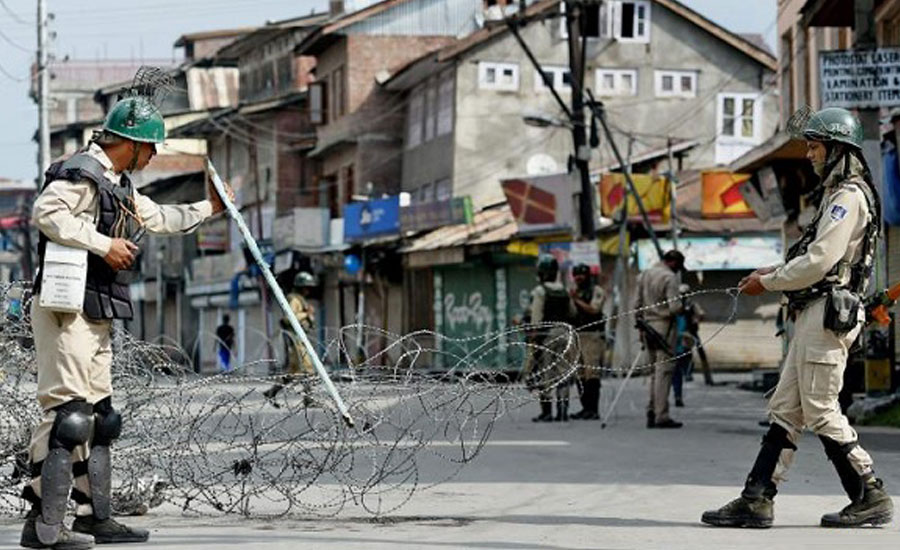Humanitarian crisis deepens amid continued curfew in IoK

SRINAGAR (92 News) – The humanitarian crisis deepened amid 30 days continued blackout and curfew by the Indian Occupied Kashmir (IoK).
According to the KMS, the Kashmir valley remains cut off from the rest of the world since August 05 due to the continued blockade and suspension of internet, mobile and landline phones and closure of TV channels.
The worst type of humanitarian crisis is looming large on the horizon of the occupied territory as people are facing acute shortage of food, medicines and other commodities.
Hospitals have run out of medicine stock, while staff finds it difficult to turn up for duty due to curfew and restrictions imposed after India scrapped Jammu and Kashmir’s special status a month ago.
The IOK businessmen, too, are staring at a grim future as shops and business establishments are yet to resume normal activities for a full a month now. Traders say carrying on routine business is impossible in the absence of mobile and Internet services.
“In 2016, the uprising lasted for six months. The businesses suffered then too, but not like this time. We would do some business then but the lack of mobile services has completely paralysed the trade now,” said Arif Ahmad, a businessmen dealing with housing products.
“I had to pay a penalty of Rs 1 lakh as the detention fee at the customs in Delhi as I was unable to collect my consignment from China on time. Due to no mobile and Internet, the information of the arrival of consignment did not reach me,” he said.
Sarwar Jan, another trader, too said the businesses had never suffered like this before. “In the past, mobile and Internet have never remained shut for a month no matter how bad the situation was. Landlines, broadband and leased-line connections would work then but this time, there is no sign of resumption of services,” he added.
“We are in a state of hopelessness and gloom. A few days back, I travelled to Delhi just to get access to Internet and mobile services. Unfortunately, the people at the helm seem to be inconsiderate to the problems faced. Our economy will be destroyed if these curbs continue,” he explained.
The clampdown has badly affected the trade between Jammu region and Kashmir Valley with manufacturers and traders unable to recover payments. An estimated financial loss of around Rs 500 crore has been suffered by industries in Jammu as they are not receiving orders nor able to recover payments from the Valley and other districts.
The restrictions have also adversely affected the tourism industry, one of the main sources of livelihood, in the occupied territory. Empty houseboats, vacant hotels and deserted resorts present a gloomy picture of Kashmir’s tourism sector.
However, officials in the Tourism Department said the department has no record of tourist arrivals in August.
In view of almost no scope of tourism in the territory, the airfares for travel in and out of Kashmir continue to record a drastic drop. The price of private tickets for travelling in and out of Kashmir has registered a record drop over the past one month since Article 370 was abrogated and restrictions were imposed.
The air tickets are currently priced at Rs 1,800 for travel from New Delhi to Kashmir.
Indian forces are using drones equipped with hi-resolution cameras and night vision devices for the surveillance of protests and other pro-freedom activities in restive Kashmir, a senior police official confirmed to the media in Srinagar.
The Indian police forces have already started trial versions of the use of drones for surveillance. The drones have been tested in some areas of Srinagar in the first phase and are being used in other districts as well to watch the activities and capture pictures and videos of the people taking part in the protests.
All such videos are stored in a central database and the same information are used for references and strategies to tackle pro-freedom activities,” said a senior official on the condition of anonymity. The Humanitarian crisis worsened in occupied valley due to the Indian atrocities.







